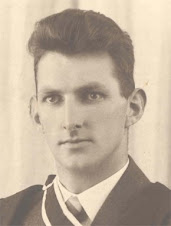Friday, July 23, 2010
Colegio Anglo Peruano - 1928
1928 was a critical one for the Colegio Anglo Peruano. At the Assembly of the Free Church of Scotland in May of that year the subject of the college was hotly debated. The McNeilage brothers led the faction that wanted it closed but there were others in favour not only of its continuance but also of its expansion. Fortunately the latter elements prevailed. In the meantime it was fast becoming imperative to look for another site. Many avenues were explored and several properties looked at. I accompanied Mr Renwick on one of these searches, which took us beyond the limits of the inner city to the south of the Spanish Arch. From the Avenida 28 de Julio at this point ran the Avenida de la Agriculture more or less parallel to the Avenida Leguia. It was called Agriculture because it led to the School of Agriculture which overlooked a park on Camilo Carrillo. Land in this vicinity was quoted at between nine and eleven soles per square metre but at that time few people could predict this being built upon in the foreseeable future and we were not among those few. The site of the Ministerio de Trabajo and the Ministerio de Salud Public was bare pampa. An ex-teacher of the Colegio Anglo, Dr Elias Ponce Rodriguez, was an exception. He purchased a block on the Avenida Mariatequi a few blocks further south and near Avenida Salaverry, on which he constructed his boarding school which he called ‘Residentia Lima’. It was about ten blocks south of the Spanish Arch on a bare and dusty pampa that more like ‘no mans land’ than anything else. Campo Marte in those days was occupied by the Hipdrome (sic), racecourse, where races were held every Sunday afternoon. It was her ein 1928 that the first mail plane carrying mail touched down one Sunday afternoon bearing mail from New York. I saw the plane land. It had taken four days to make the journey.
Wednesday, July 21, 2010
Pacasmayo
As soon as the news of our engagement reached Cajamarca, Rev and Mrs Calvin Mackay, who were in charge of the Free Church mission there, wrote back inviting us to spend our vacation and celebrate the marriage there which we did. The journey to Cajamarca was quite an adventure in itself, although prior to this it had been still more so. We travelled by sea to Pacasmayo on a coastal boat, which called at every port loading and unloading cargo. First class on the boat was only recognisable by comparison with third class which was much worse. On the deck immediately below our cabins were the stalls of cows and pigs. Nowhere on the ship could we escape that stable smell. Third class passengers lived in closer proximity still to the animal cargo. Loading and unloading the animals was an interesting experience. A loop of spliced roped was placed under the animals horns and attached to a winch. The signal was then given to hoist and the animal was pulled up head first. It’s eyes would bulge out like a couple of fried eggs and its feet would stick out at right angles in front of it as it is spun giddily above the lighter and was hoisted on board. Three days later we reached Pacasmayo.
Pacasmayo in the ‘good old days’ was quite a primitive place on all counts. The water supply was obtained from a little creek which served every purpose under the sun. The women washed clothes in it, the children bathed and the pigs wallowed in it and at relatively clear spots, water was baled out for household purposes. One look at the source of the water supply was more powerful than a law against intoxicating spirits. A friend of mine, who would not trust the water even when it was boiled, bought a half bottle of beer each night with which to clean his teeth and gargle. Naturally we did not remain in Pacasmayo any longer than was strictly necessary. Next day we took the train up the Jequetepequi Valley to the railway terminus at Chilete. The hotel there was even more primitive than that at Pacasmayo. On our return journey, our bedroom, which opened out onto the street could only be closed properly by propping a broken chair against it. A drunk tried to force his way in during the night but was unable to dislodge the chair.
Pacasmayo in the ‘good old days’ was quite a primitive place on all counts. The water supply was obtained from a little creek which served every purpose under the sun. The women washed clothes in it, the children bathed and the pigs wallowed in it and at relatively clear spots, water was baled out for household purposes. One look at the source of the water supply was more powerful than a law against intoxicating spirits. A friend of mine, who would not trust the water even when it was boiled, bought a half bottle of beer each night with which to clean his teeth and gargle. Naturally we did not remain in Pacasmayo any longer than was strictly necessary. Next day we took the train up the Jequetepequi Valley to the railway terminus at Chilete. The hotel there was even more primitive than that at Pacasmayo. On our return journey, our bedroom, which opened out onto the street could only be closed properly by propping a broken chair against it. A drunk tried to force his way in during the night but was unable to dislodge the chair.
Subscribe to:
Posts (Atom)





